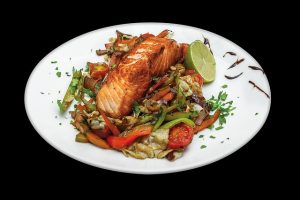Consider A Pegan Diet

Image courtesy of Pixabay
Have you heard of a Pegan Diet? It is a blend of paleo and vegan. I know that may sound crazy, since paleo is very meat focused and vegan is no animal products at all!
Pegan is the middle ground between the two. The term was coined by Dr. Mark Hyman who recommends dietary guidelines that combine the best of both “paleo” and “vegan” ways of eating.
Dr. Hyman is a physician and best-selling author of books such as Eat Fat, Get Thin: Why the Fat We Eat Is the Key to Sustained Weight Loss and Vibrant Health. He is also the founder and medical director of The UltraWellness Center in Massachusetts.
Here is the CliffsNotes version of Dr. Hyman’s recommendations.
- Stay away from sugar. I think most dietitians and other health professionals would agree that processed sugar is not healthy for us. Avoiding sugar also means avoiding white flour!
- Eat mostly plants. The plant-based diet has long been recommended by scientists. When I was in college waaaaay back in the 80s, I attended my biology professor’s lecture advocating for a predominantly plant-based diet. Nothing new here.
- Easy on fruits. Some fruits, like bananas, have very high sugar content. Enjoy low glycemic fruits – fruit that doesn’t make your blood sugar spike – and leave high glycemic fruit for a special treat.
- Stay away from pesticides, antibiotics, and hormones. I think we all know that consuming foods that have been exposed to pesticides is unhealthy and exposure to antibiotics and hormones in our food can cause health problems for us down the line.
- Eat foods containing healthy fats. The Pegan Diet recommends avocado, olive oil, and the fat found in nuts and seeds. Also consider saturated fat from fish, whole eggs, and grass-fed or sustainably raised meat, grass-fed butter or ghee, and coconut oil or coconut butter.
- Stay away from most vegetable, nut, and seed oils. Eat the nuts and seeds, but not the oil pressed from them! The most common vegetable oils include rapeseed (canola oil), soybean, corn, sunflower, safflower, and peanut oil. These oils were non-existent until late in the 20th century.
Vegetable oils contain very high levels of polyunsaturated fats (PUFAs), which are highly unstable and oxidize easily. Oxidized fats cause inflammation linked to all sorts of issues like cancer, heart disease, endrometriosis.
- Avoid or limit dairy. Don’t cry just yet dairy lovers! You can enjoy the occasional yogurt, kefir, grass-fed butter, ghee, and even cheese if it doesn’t cause any digestive problems for you. Try goat or sheep products instead of cow dairy. And always go organic and grass-fed!








